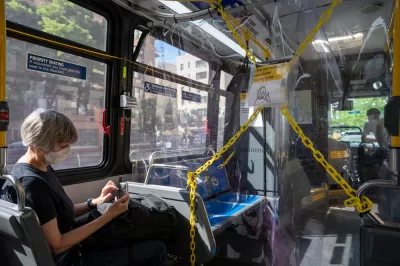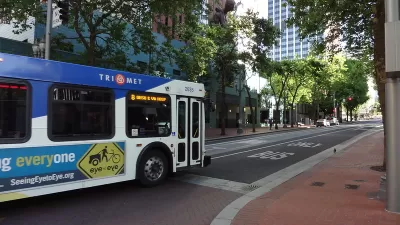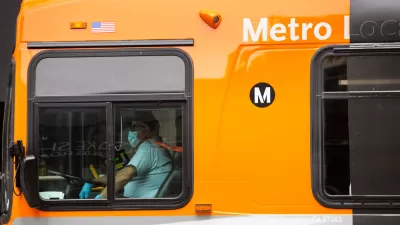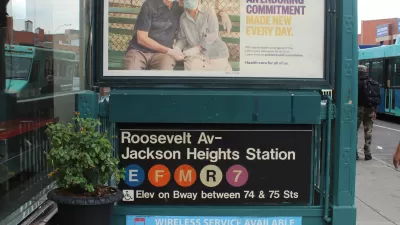A group of 12 leading transit experts debriefed on the consequences of the pandemic for public transit, and proposed a future that centers public transit as a tool for economic recovery and righting the past wrongs of the planning profession.

"Covid-19 wreaked havoc with America’s public transportation networks," writes Tanya Snyder to introduce the proceedings of a recent panel discussion between 12 leading transit experts on the future of public transit in the post-pandemic world.
"Empty buses and train cars were a good sign, at first, that people were heeding calls for social distancing," continues Snyder. "Within weeks, we realized that grocery employees and hospital workers, renamed “essential workers” and lauded as heroes, were struggling to get to work as the transit systems they relied on cut schedules. People found it hard to make essential trips and access medical care. It turned out that even during a lockdown, public transportation is the artery through which the lifeblood of cities flows."
The cultural and economic position of public transit evolved constantly during the pandemic, and the likelihood that the future of public transit is likely to be a source of political consternation and technological innovation inspired Politico to gather a panel of 12 leading transit advocates, planners, system designers, and government officials from around the world for a two-hour zoom discussion about the future of transit.
The discussion started with a recap of the major events and themes of transit during the pandemic (e.g., "widespread service cuts," disparate impacts, migration, disappearing rush hour, and "hub-and-spoke systems became obsolete"). The second part of the discussion focused on how to "future-proof" public transit for life after COVID. The subheadings of the part of the discussion are listed below, with more details provided in the source article:
- It's time to end transit red-lining
- Refocus on bus service
- Detangle jurisdictions
- Make driving worse
- Revamp data systems
FULL STORY: Policy Hackathon: Can public transit recover from Covid-19?

Alabama: Trump Terminates Settlements for Black Communities Harmed By Raw Sewage
Trump deemed the landmark civil rights agreement “illegal DEI and environmental justice policy.”

Planetizen Federal Action Tracker
A weekly monitor of how Trump’s orders and actions are impacting planners and planning in America.

The 120 Year Old Tiny Home Villages That Sheltered San Francisco’s Earthquake Refugees
More than a century ago, San Francisco mobilized to house thousands of residents displaced by the 1906 earthquake. Could their strategy offer a model for the present?

BLM To Rescind Public Lands Rule
The change will downgrade conservation, once again putting federal land at risk for mining and other extractive uses.

Indy Neighborhood Group Builds Temporary Multi-Use Path
Community members, aided in part by funding from the city, repurposed a vehicle lane to create a protected bike and pedestrian path for the summer season.

Congestion Pricing Drops Holland Tunnel Delays by 65 Percent
New York City’s contentious tolling program has yielded improved traffic and roughly $100 million in revenue for the MTA.
Urban Design for Planners 1: Software Tools
This six-course series explores essential urban design concepts using open source software and equips planners with the tools they need to participate fully in the urban design process.
Planning for Universal Design
Learn the tools for implementing Universal Design in planning regulations.
Clanton & Associates, Inc.
Jessamine County Fiscal Court
Institute for Housing and Urban Development Studies (IHS)
City of Grandview
Harvard GSD Executive Education
Toledo-Lucas County Plan Commissions
Salt Lake City
NYU Wagner Graduate School of Public Service





























